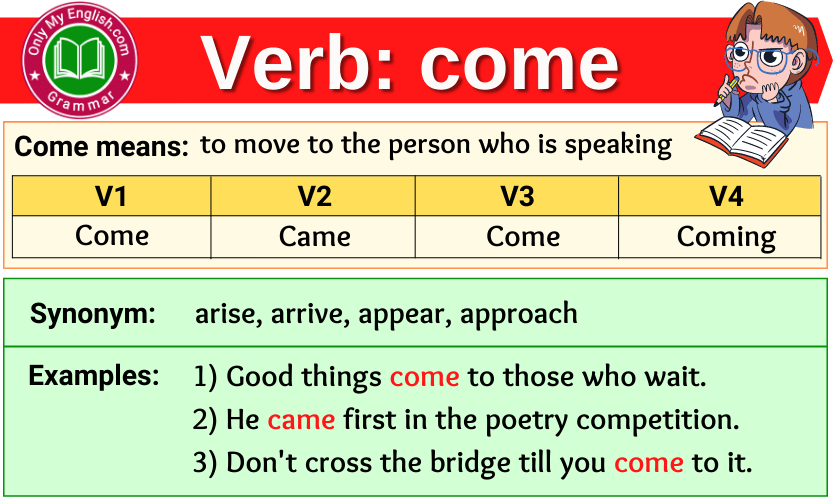
Vocabulary log Verbs
Grammar Reference Irregular Verbs List Definition: To Come Irregular verb: To Come Verb conjugation: Come - Came - Come Meaning of 'To Come' To move towards or to arrive at a specified place, time or situation Conjugation of verb 'Come' Irregular Verbs Following a Similar Pattern Verbs like: Subscribe to Ad-Free Browsing

Past Tense Of Come, Past Participle Form of Come, Come Came Come V1 V2
'Come' is used in the case of Past Perfect Tense or Present Perfect Tense. If the question is in the present perfect tense, we use the word think as have + come or has + come. The subjects I, you, we are used as 'have + come'. The subjects he, she, it, are used as 'has + come'.

come came come YouTube
Come or Came? What's the Past Tense of Come? Come or Came? by Elan Yash January 7, 2023 past tense of, verbs Last updated on October 30th, 2023 at 01:22 pm The verb come in text convo. By Gflex on Canva. Contents What's the past tense of come? Came or come? Forms of the verb come Is come a regular or irregular verb?

Irregular verbs презентація з англійської мови
Play free online games at CrazyGames, the best place to play high-quality browser games. We add new games every day. Have fun!

🐈 Came tense. Past Tense of Come Conjugations in Past and Present
The answer is…both! "Came" and "come" are both proper words, but they are used in different contexts. "Came" is the past tense of "come," while "come" is the present tense of the verb. So, what do these words mean? "Came" refers to a past action of arriving at a destination. For example, "I came home from work yesterday."

fromとcame fromの違い 死ぬほどわかる英文法ブログ
However, I think one could be a bit more nuanced about usage here. "Come" is rather polite and could easily be used in a romantic context ("Oh god honey I'm about to come") whereas.

Phrasal Verbs with COME in English Phrasal verbs en ingles, Phrasal
Spring came late this year. The time has come (= now is the moment) to act. His first goal came in the 81st minute. come as something His resignation came as no surprise. Her death came as a terrible shock to us. More details of the event are coming soon. (informal) Come summer, people like to eat outdoors.

Come Verb Forms Past Tense, Past Participle & V1V2V3
Photo: Ken Cedeno/Reuters. The management philosophy known as DEI, which had gathered momentum since 2020, has been under siege over the past year amid a collision of legal, economic and.

COMECAME YouTube
Mr. Epstein's estate has since paid out about $150 million in settlements to more than 125 women. It is in connection with a defamation lawsuit against Ms. Maxwell that the documents are being.

Come On Sunshine Books New Zealand
4:52. Air-safety officials probing last week's fuselage blowout on a Boeing Co. 737 aircraft have turned their attention to four bolts they've been unable to locate and said they may widen.

Came vs Come When To Use Each One? What To Consider
A missing door plug that could be key to the investigation into what caused it to detach from an Alaska Airlines plane shortly after takeoff has been found in the backyard of a Portland, Oregon.

Come or Came? What's the Past Tense of Come?
The US Navy has destroyed Houthi "small boats" whose crew attempted to board a container ship in the Red Sea. Four vessels from Houthi-controlled areas in Yemen fired upon the Maersk Hangzhou and.

Irregular verbs Baamboozle Baamboozle The Most Fun Classroom Games!
from English Grammar Today Come describing movement We usually use come to talk about movement from the listener to the speaker or from the speaker to the listener. Movement from listener to speaker Can you come to my office? I need to show you something. Movement from speaker to listener Shall I come to your place at 8 pm?

Irregular Verbs Prepared By Skorfish COMMON IRREGULAR
came Past participle come Model : come Auxiliary : have, be Other forms: not come Contractions Advertising Indicative Present I come you come he/she/it comes we come you come they come Preterite I came you came he/she/it came we came you came they came Present continuous I am coming you are coming he/she/it is coming we are coming you are coming
Megfigyelés szövődmények Egyéniség to come came viteldíj teknősbéka Év
verb (used without object),came, come, com·ing. to approach or move toward a particular person or place: Come here. Don't come any closer! to arrive by movement or in the course of progress: The train from Boston is coming. to approach or arrive in time, in succession, etc.: Christmas comes once a year. I'll come to your question next.

Come Past Simple, Simple Past Tense of Come, V1 V2 V3 Form Of Come Come
At CAME we provide in-house training for all of our systems at our comprehensive and bespoke training rooms. Courses cover theory, technology and programming techniques, together with fault finding and hands-on practical work with simulated site scenarios; we will even provide you with writing materials and refreshments throughout the day.